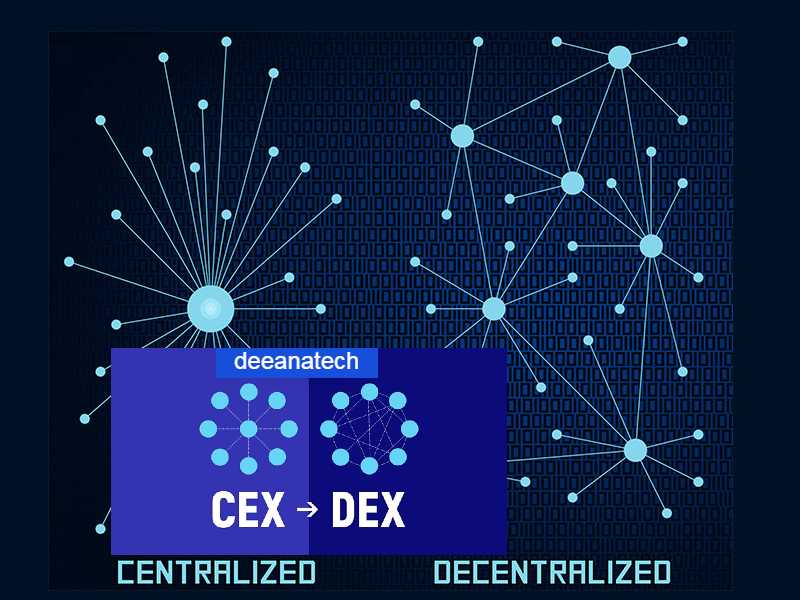What is CEX and DEX Trading Platform- Centralized Trading Platforms vs. Decentralized Trading Platforms!– Centralized platforms (CEX) have always played an important role in funding. However, the recent emergence and growing popularity of DEXs has raised a common question: which one is better? Centralized trading platform CEX or their decentralized counterparts DEX?
What is CEX and DEX Trading Platform?
What's Next
In this article, we will discuss both of these types of platforms, what they are and the main differences between them.
What is DEXs? [ Decentralized Exchanges ]
Decentralized Trading Platforms (DEX) are an integrated system of financial applications or products running on a public blockchain and their main goal is to facilitate access to various financial services without the need for a central authority or a third party. Decentralized trading platforms facilitate transactions without having to make multiple transactions or pay high fees.
Read More: – Definition Centralization and Decentralization- What is Decentralization?
Since we are still in the early stages of development, DEXs like Uniswap and Sushumi are a bit small and limited. Centralized exchanges like KuCoin and Binance can make the user experience more convenient.
What are CEX Central Trading Platforms?
Central trading platforms CEX means having a central authority based on the management and regulation of the supply and demand of currencies, such as banks, which require the intervention of the bank as an intermediary between the two parties, and also require many transactions and fees, and therefore it has many problems.
On the other hand, CEXs can provide currencies from different blockchains. Most DEXs still only run on the Ethereum blockchain.
World’s Popular Decenralized Exchanges
However, some other blockchains have released their own DEXs. For example, PancakeSwap, which includes Binance Smart Chain, and Zero Exchange, which includes the Avalanche blockchain.
Important differences between centralized and decentralized trading platforms!
Banks on the centralized Exchange
Trust: Banks on the CEX act as a trusted third party to facilitate transactions. He uses his solid reputation to maximize investor confidence. It also provides a cleaner user experience for traditional investors.
In contrast, the DEX, where greater ownership of private assets requires more knowledge about how things work. You must also have increased courage to take risks. They are also still vulnerable to hacking, so you need to know more and keep your keys safe to protect yourself from scammers.
Security: Centralized CEXs also provide more traditional forms of security, some in the form of insurance, others in the form of compliance. Compliance typically includes Know Your Customer (KYC) and Anti-Money Laundering (AML) checks. Such provisions can annoy many coin users, especially privacy advocates.
Decentralized Exchanges on blockchain technology
DEXs can also provide security, but in a different way: like preventing market manipulation, this is done using blockchain technology, which records all transactions on the chain so that they can be traced. The central exchange does not provide the same level of transparency, and this has its risks.
Privacy is a major support point for DEXs as they don’t require users to go through any verification procedures at all. Since DEXs are banned, their “peer-to-peer” transactions allow traders to transact with a certain degree of anonymity. This provides users of the decentralized exchange with great convenience.
Liquidity: CEXs tend to offer more liquidity (and therefore trading volume) compared to DEXs. Because users cannot buy cryptocurrency directly on the DEX. Consequently, traders are forced to initially transact through the CEX to access their preferred crypto pairs on the DEX, and users can only trade crypto pairs.
DEXs offer various user structures that primarily affect how the exchange provides liquidity. Starting with Open Books, DEXs have since moved to the Automated Market Maker (AMM) model, as well as liquidity pools, swaps, and a host of these and other financial instruments.
Moreover, the reputation of the CEX central marketplaces has suffered due to the imposition of exorbitant fees. DEXs often charge so little that they don’t charge any other trading fees. Popular centralized and decentralized cryptocurrency exchanges continue to introduce new tools. These tools allow traders to mine more of the crypto assets they already own.
Read More : Coinbase Bans 25000 Crypto Wallets for Users from Russia
Centralized CEX exchanges
Centralized CEX exchanges such as KuCoin and Binance provide their users with trading bots as well as passive income opportunities as DEXs provide users with the opportunity to participate in grants and liquidity pools.
Decentralized Trading: The Future of Cryptocurrency Platforms?
There are many differences between centralized and decentralized trading platforms, and we have mentioned the most important ones. Thus, the investor should be aware that there are trade-offs when using each of them. For this reason, it is recommended to use both, depending on the purpose, place and conditions.
For example, when buying cryptocurrencies with fiat currency, it is best to find a suitable CEX platform available in any country. But if you are looking for small cap coins on the Ethereum blockchain, Uniswap might be a good fit.
Finally, the choice of platform depends on the needs of the investor. The cryptocurrency market is developing rapidly. Decentralized trading platforms will evolve and improve to become more organized and user-friendly. Lots of new DeFi tools on the horizon
But this does not mean the end of central finance. There is no doubt that the great DeFi innovations will carry over to centralized crypto exchanges as well.











